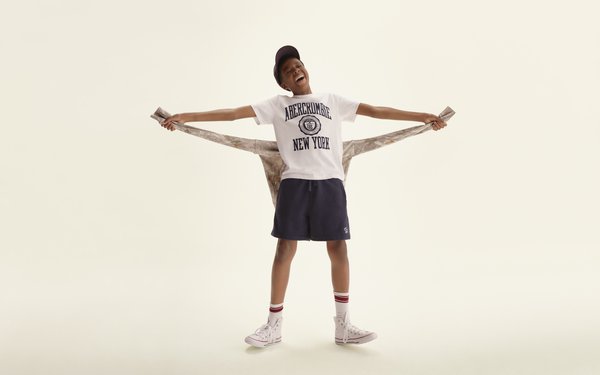
Macy’s wants in on the cool-kid crowd. Its latest back-to-school
play? Adding Abercrombie Kids to its brand roster -- a move aimed at winning over fashion-conscious families and shoring up its style cred. The beloved label joins a long list of national brands at
the retailer, including Nike, Jordan, Adidas, the North Face, as well as Epic Threads, the private-label kids line Macy’s relaunched last year.
Like every other retailer, the chain is
hoping to cash in on less-predictable behavior from parents, including earlier shopping and a fierce focus on online deals and promotions. While the National Retail Federation’s surveys predict
a decline in overall spending this year, with the average family spending $858 on clothing, shoes, school supplies, and electronics, down from $875 last year, it forecasts a bit of an increase in
apparel and electronics.
advertisement
advertisement
Earlier shopping habits may help Macy’s. Placer.ai, which measures traffic to retailers, says the lift to stores this spring indicates that people may have
started thinking about back-to-school purchases as early as May, when department store traffic was about 1.2% higher than the same period last year.
The research company says ongoing trends
point to a “generally resilient consumer.” And while last year's big back-to-school winners -- including department stores -- will likely perform well again in 2025, Placer.ai predicts
that secondary categories, such as home furnishings, off-price, and thrift stores, may be the ones to come out on top this year.
The Abercrombie deal is the latest example of
Macy’s broader merchandising reinvention. With comparable sales down 2% and activist investors circling, the retailer is moving ahead with other holistic transformation plans. Observers are
responding positively to a recent increase in the size of a debt buyback program, a move investors saw as a sign of financial strength and improved cash flow.
But analysts say the comeback
won’t be easy. “Macy’s is struggling to stay relevant,” writes David Swartz of Morningstar, pointing to over a decade of market-share losses and underwhelming sales growth.
While he applauds Macy’s strategy -- closing weak stores, expanding Bloomingdale’s and Bluemercury, testing smaller formats -- he’s blunt about the outlook: “Confidence in a
strong turnaround is low.”
Years of strategic plans have failed to improve overall same-store sales growth, he notes, which have consistently been below 2% for 10 years.